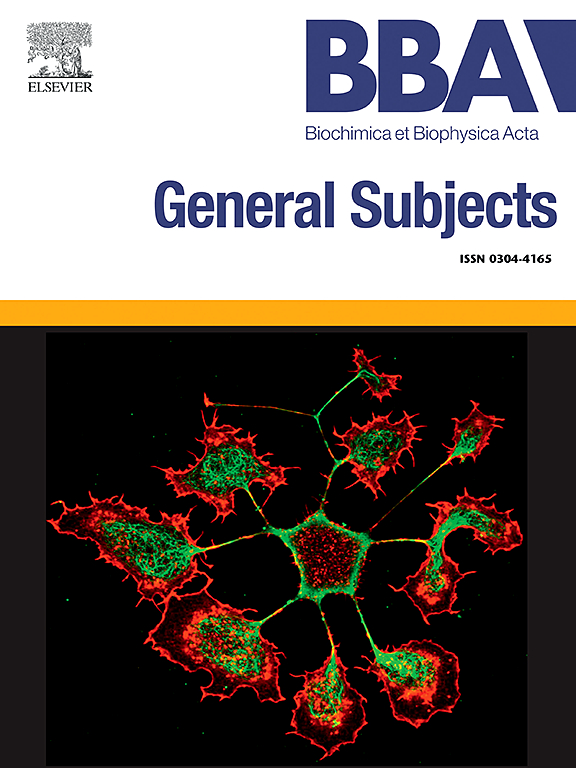单体重组丁茶单精子凝集素作为胆管癌诊断和预后生物标志物的研制
IF 2.2
3区 生物学
Q3 BIOCHEMISTRY & MOLECULAR BIOLOGY
Biochimica et biophysica acta. General subjects
Pub Date : 2025-08-25
DOI:10.1016/j.bbagen.2025.130852
引用次数: 0
摘要
天然丁茶单精子凝集素(nBMA)是从丁茶单精子植物的种子中分离出来的一种凝集素,它与半乳糖、n -乙酰半乳糖胺和乳糖特异性结合。本研究构建了在大肠杆菌中表达的重组BMA β链(rBMA)。rBMA以单体形式存在,保留天然结构和糖结合能力,而不表现出血凝活性。通过CCA细胞株凝集素细胞荧光染色评价rBMA的结合活性。与nBMA相似,rBMA对CCA细胞系表现为阳性信号,但在不同细胞系中表现为强信号。高碘酸钠处理消除了rBMA在CCA组织和血清斑点斑点中的结合,证实了碳水化合物依赖的相互作用。糖结合特异性的中和活性表明,rBMA与糖基化多糖复合物结合,而不是与单糖和双糖结合。我们发现,血清点阵检测中rBMA结合聚糖水平升高可将CCA患者与健康个体区分开来,诊断敏感性为92.9%,特异性为36%,总体准确性为74%。高水平的血清rbma结合聚糖与CCA患者较差的生存率相关,并与血清碱性磷酸酶水平直接相关。癌胚抗原与CA19-9水平无相关性。这些发现表明血清rbma结合聚糖是反映CCA进展的潜在生物标志物。rBMA的单体性质和保留的聚糖特异性,加上其缺乏血凝活性,使其成为比nBMA更优越的诊断应用候选者,并成为CCA靶向治疗开发的有希望的平台。本文章由计算机程序翻译,如有差异,请以英文原文为准。

Development of a monomeric recombinant Butea monosperma agglutinin as a diagnostic and prognostic biomarker for cholangiocarcinoma
Native Butea monosperma agglutinin (nBMA), is a lectin isolated from the seeds of the Butea monosperma plant, which binds specifically to galactose, N-acetylgalactosamine, and lactose. This study developed a recombinant β-chain of BMA (rBMA) expressed in Escherichia coli. The rBMA exists in a monomeric form, retains native structure and sugar-binding capacity without exhibiting hemagglutination activity. The binding activity of rBMA was evaluated through lectin-cytofluorescent staining of CCA cell lines. Similar to nBMA, rBMA exhibited a positive signal to CCA cell lines but displayed a strong signal in different cell lines. Sodium periodate treatment abolished rBMA binding in CCA tissues and serum dot blots, confirming carbohydrate-dependent interactions. The neutralizing activity for sugar binding specificity indicated that rBMA binds to the complex glycosylated glycans rather than mono- and di-saccharides. Elevated levels of rBMA binding glycans in serum dot blots were found to differentiate CCA patients from healthy individuals, achieving a diagnostic sensitivity of 92.9%, specificity of 36%, and overall accuracy of 74%. High levels of serum rBMA-binding glycans were associated with poorer survival in CCA patients, and directly correlated with serum alkaline phosphatase levels. No correlation was found with carcinoembryonic antigen and CA19–9 levels. These findings position serum rBMA-binding glycans as potential biomarkers reflecting CCA progression. The monomeric nature and retained glycan specificity of rBMA, coupled with its absence of hemagglutination activity, make it a superior candidate to nBMA for diagnostic applications and a promising platform for targeted therapeutic development for CCA.
求助全文
通过发布文献求助,成功后即可免费获取论文全文。
去求助
来源期刊

Biochimica et biophysica acta. General subjects
生物-生化与分子生物学
CiteScore
6.40
自引率
0.00%
发文量
139
审稿时长
30 days
期刊介绍:
BBA General Subjects accepts for submission either original, hypothesis-driven studies or reviews covering subjects in biochemistry and biophysics that are considered to have general interest for a wide audience. Manuscripts with interdisciplinary approaches are especially encouraged.
 求助内容:
求助内容: 应助结果提醒方式:
应助结果提醒方式:


